新目标九年级英语教案unit9
- 格式:doc
- 大小:77.50 KB
- 文档页数:9
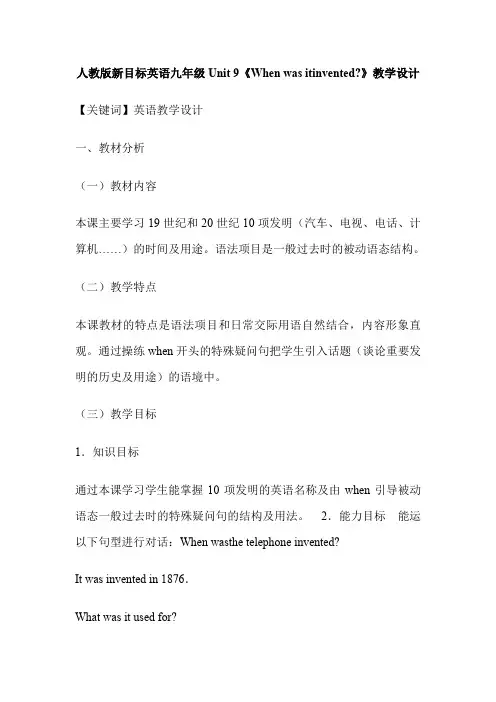
人教版新目标英语九年级Unit 9《When was itinvented?》教学设计【关键词】英语教学设计一、教材分析(一)教材内容本课主要学习19世纪和20世纪10项发明(汽车、电视、电话、计算机……)的时间及用途。
语法项目是一般过去时的被动语态结构。
(二)教学特点本课教材的特点是语法项目和日常交际用语自然结合,内容形象直观。
通过操练when开头的特殊疑问句把学生引入话题(谈论重要发明的历史及用途)的语境中。
(三)教学目标1.知识目标通过本课学习学生能掌握10项发明的英语名称及由when引导被动语态一般过去时的特殊疑问句的结构及用法。
2.能力目标能运以下句型进行对话:When wasthe telephone invented?It was invented in 1876.What was it used for?It was used for talking to people in other places.培养学生的观察、分析能力,快速反应能力,自学能力和用英语交流的能力。
3.德育目标教育学生爱学习,爱科学,开阔学生的思路,培养学生的创造精神。
(四)教学重点和难点重点:口头掌握本课核心句型When was the telephone invented?It was invented in 1876.What was it used for?It was used for talking to people in other places.难点:when引导被动语态一般过去时的特殊疑问句的结构及用法。
二、学习分析苏霍姆林斯基认为:“教给学生方法比教给学生知识更重要。
”建构主义是近年来介绍到我国的一种新兴教育理论,它认为知识不是通过教师传授得到,而是学习者在一定的情境即社会文化背景下,借助学习过程中其他人(包括教师和学习伙伴)的帮助,利用必要的学习资料,通过意义建构的方式获得的。
基于这样的认识,结合本课内容和初三年级学生的特点及学习经历,在教学中我侧重指导学生采用以下三种学习方法:1.合作学习法。
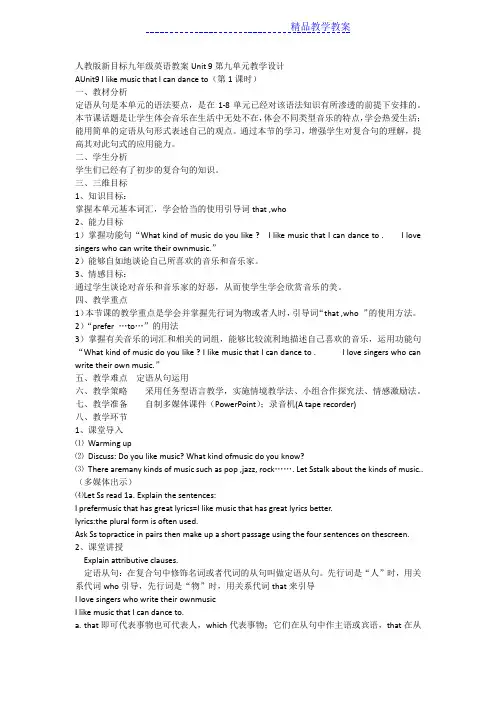
人教版新目标九年级英语教案Unit 9第九单元教学设计AUnit9 I like music that I can dance to(第1课时)一、教材分析定语从句是本单元的语法要点,是在1-8单元已经对该语法知识有所渗透的前提下安排的。
本节课话题是让学生体会音乐在生活中无处不在,体会不同类型音乐的特点,学会热爱生活;能用简单的定语从句形式表述自己的观点。
通过本节的学习,增强学生对复合句的理解,提高其对此句式的应用能力。
二、学生分析学生们已经有了初步的复合句的知识。
三、三维目标1、知识目标:掌握本单元基本词汇,学会恰当的使用引导词that ,who2、能力目标1)掌握功能句“What kind of music do you like ? I like music that I can dance to . I love singers who can write their ownmusic.”2)能够自如地谈论自己所喜欢的音乐和音乐家。
3、情感目标:通过学生谈论对音乐和音乐家的好恶,从而使学生学会欣赏音乐的美。
四、教学重点1)本节课的教学重点是学会并掌握先行词为物或者人时,引导词“that ,who ”的使用方法。
2)“prefer …to…”的用法3)掌握有关音乐的词汇和相关的词组,能够比较流利地描述自己喜欢的音乐,运用功能句“What kind of music do you like ? I like music that I can dance to . I love singers who can write their own music.”五、教学难点定语从句运用六、教学策略采用任务型语言教学,实施情境教学法、小组合作探究法、情感激励法。
七、教学准备自制多媒体课件(PowerPoint);录音机(A tape recorder)八、教学环节1、课堂导入⑴Warming up⑵Discuss: Do you like music? What kind ofmusic do you know?⑶There aremany kinds of music such as pop ,jazz, rock……. Let Sstalk about the kinds of music..(多媒体出示)⑷Let Ss read 1a. Explain the sentences:I prefermusic that has great lyrics=I like music that has great lyrics better.lyrics:the plural form is often used.Ask Ss topractice in pairs then make up a short passage using the four sentences on thescreen. 2、课堂讲授Explain attributive clauses.定语从句:在复合句中修饰名词或者代词的从句叫做定语从句。

Unit 9I like music that I can dance to.Section A (1a-2d)1.重点单词:prefer,lyrics,Australian,electronic,suppose,smooth,spare,case,director,war2.重点短语:sing along with,dance to,different kinds of,in that case3.重点句式:—What kind of music do you like?—I like music that I can sing along with.Carmen likes musicians who play different kinds of music.I prefer movies that give me something to think about.1.重点短语和句型2.定语从句定语从句一、预习课本P65-66新单词并背诵,完成下面的汉译英。
1.更喜欢________ 2.歌词________3.电子的________ 4.推想________5.平滑的________ 6.空闲________7.情况________ 8.导演________9.战争________ 10.澳大利亚的________二、认真预习1a-2d找出下列短语和句型。
1.随之唱歌________________________________________________________ ________________2.随着……跳舞________________________________________________________ ________________3.不同种类的________________________________________________________ ________________4.既然那样________________________________________________________ ________________5.—你喜欢什么种类的音乐?—我喜欢能跟着唱的音乐。
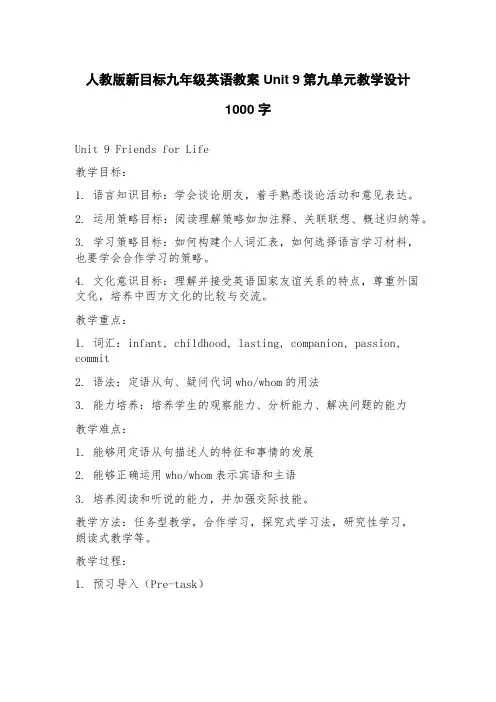
人教版新目标九年级英语教案Unit 9第九单元教学设计1000字Unit 9 Friends for Life教学目标:1. 语言知识目标:学会谈论朋友,着手熟悉谈论活动和意见表达。
2. 运用策略目标:阅读理解策略如加注释、关联联想、概述归纳等。
3. 学习策略目标:如何构建个人词汇表,如何选择语言学习材料,也要学会合作学习的策略。
4. 文化意识目标:理解并接受英语国家友谊关系的特点,尊重外国文化,培养中西方文化的比较与交流。
教学重点:1. 词汇:infant, childhood, lasting, companion, passion, commit2. 语法:定语从句、疑问代词who/whom的用法3. 能力培养:培养学生的观察能力、分析能力、解决问题的能力教学难点:1. 能够用定语从句描述人的特征和事情的发展2. 能够正确运用who/whom表示宾语和主语3. 培养阅读和听说的能力,并加强交际技能。
教学方法:任务型教学,合作学习,探究式学习法,研究性学习,朗读式教学等。
教学过程:1. 预习导入(Pre-task)通过显示26个英文字母,让学生回忆并列出所有以字母“F”开头的词汇,包括名词、形容词和动词。
教师在课堂前五分钟录下结果。
集体看一看,并补全缺少的词汇。
2. 输入新信息(Input)(1)任务1 完形填空让学生看到P63-P64的Team Building后,完成练习。
(2)任务2 阅读理解让学生阅读第一篇文章。
找到文章中描述朋友关系的词句,把它们圈起来。
(只用一分钟)接着,再读文章一遍,用自己的话回答问题。
(3)任务3 语法:定语从句a. 回忆练习:请学生跟随老师大声读一遍P66中的例句,并在课本上用横线把定语从句圈出来。
b. 给出Grammars P93中的定语从句。
分类规定。
c. 设计练习。
请学生阅读P93中的定语从句,并按照汉语意思,写出英语句子。
例如:我能听懂讲师讲英语的课。
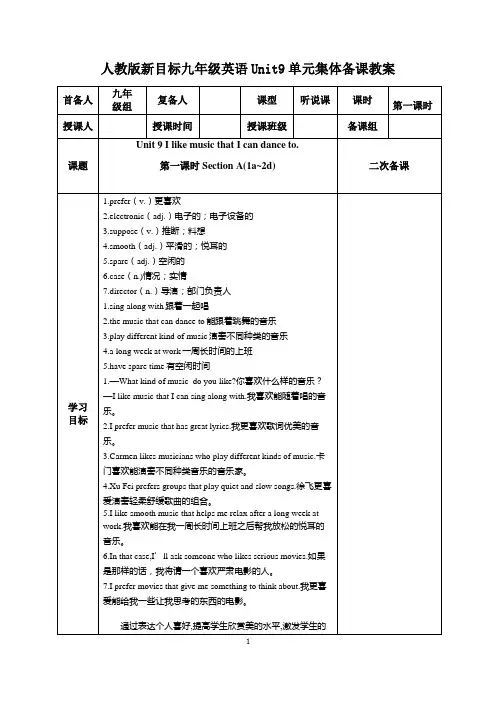
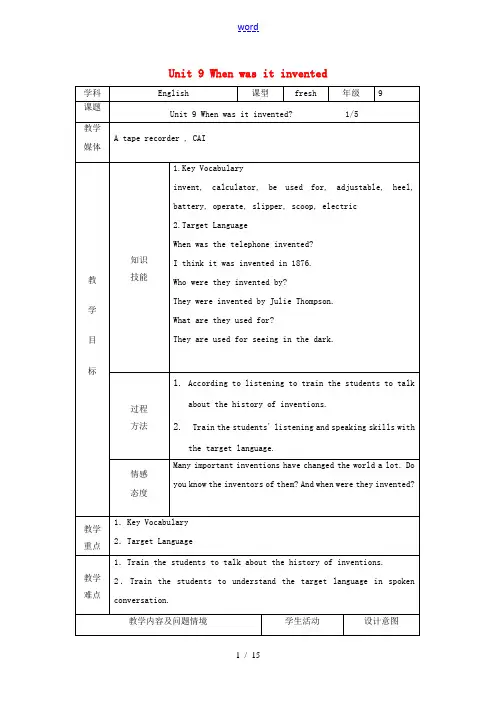

人教版新目标九年级英语Unit9单元集体备课教案Unit 9: I Like Music That I Can Dance ToIn this unit。
we will learn some new vocabulary words and phrases such as "prefer," "electronic," "suppose," "smooth," "spare," "case," and "director." We will use these words to talk about our XXX.When someone asks us what kind of music we like。
we can answer by saying。
"I like music that I can sing along with." This means that we enjoy singing along to the music we listen to。
Another way to express our preference is by saying。
"I prefer music that has great lyrics." This means that we enjoy music with beautiful and meaningful lyrics.We can also talk about our friends' XXX。
XXX who play different kinds of music。
This means that she XXX who can playdifferent genres of music。

新目标英语go for it九年级上unit 9教案二篇4:九年级英语unit9课件一、教学目标:1. 语言知识目标:1) 能掌握以下单词:prefer, lyrics2)掌握I like /love/prefer music that…表达喜欢的音乐。
3)掌握 I like music that I can dance to. / I like movies that are funny.句型的用法。
3) 学习关系代词that引导的定语从句。
2. 情感态度价值观目标:1. 使学生学会谈论自己的喜好。
2. 通过表达个人喜好,提高学生欣赏美的水平。
3. 激发学生的学习兴趣和学习热情。
二、教学重难点1. 教学重点:1)prefer, kinds of, sing along with的'用法。
2)句型: I like music that I can dance to.I like movies that are funny.2. 教学难点:学习关系代词that引导的定语从句。
三、教学过程Step I : Lead-inDo you like music? Ss…I like music, too. Let’s listen to a piece of music. What do you think of it ?I like music that I can dance. ( 板书课题)Step2 Presentation1. Show some music and lead Ss to say the target languagesI love music that I can sing along with.I prefer music that has great lyrics.I like music that isn’t too loud.I like music that makes me excited.2. Ask what kind of movies do you like?I like movies that are funny.I like movies that have a great story.3. Drill the target languages.Make a example sentence. Know about The Attributive Clause. Then pare two sentences and summary the grammar about The Attributive Clause.Step 3. 1c Pair work1. Make a example conversation to Ss.2.Then ask them to make conversations with their partners using the target languages.3. Ss show their conversations.Step 4 1b listening1. Finish the listening and check the answers.2. Ask Ss to read after the tape.Step 5 Group work1. Make a survey in the class . Ask :What kind of music do they like?What kind of movies do they like?2. Ask Ss to write their sentences on the Bb.Step6 SummarySummarize the language points in this class.Step 7 Exercise1. I like music. The music is very gentle.Key: I like music that is very gentle.3. I like the music better. I can dance to the music.Key: I prefer music that I can dance to.3. I like movies. The movies are funny. They are my favorite.Key: I prefer movies that are funny.Homework1. Remember the language points and grammar.2. Read the conversation in 1b.Bb designUnit 9 I like music that I can dance to .I can dance tolike I sing along withI love music that has great lyricsprefer isn’t too loudmakes me….are funnyI like movies that have a great story教学反思:这节课上了之后,大多数同学都能熟练的使用 I like music that I can dance to(sing along with) ; I like music that isn’t too loud 等句型,初步了解了定语从句的特征:即先行词是名词或者代词,一个句子来做定语;在句子中指代的是物就用关系代词that.但是还有几个同学还不能准确的使用prefer A to B和prefer doing sth to doing等结构,课后还需要个别辅导一下。
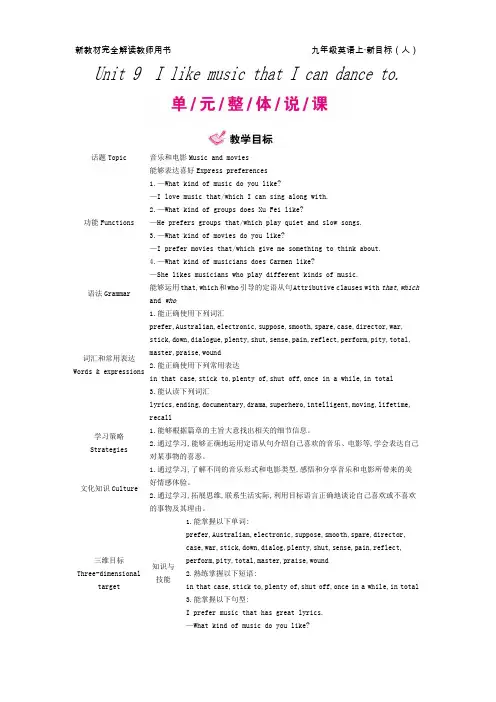
新教材完全解读教师用书九年级英语上·新目标(人)Unit 9 I like music that I can dance to.1.本部分主要涉及自己喜爱的事物,掌握一些与音乐和电影相关的词汇,理解1.掌握that,who和which引导的定语从句的基本用法。
2.学会使用that,who和which引导的定语从句完整地表达对某事物的好恶。
3.运用noting supporting details的阅读策略对文本进行阅读,完成相关的阅读任务,了解音乐评介类的文章特点。
4.运用具体信息描写事物,能够运用书面语言写音乐或者电影的评论。
针对本单元Music and movies话题所涉及的谈论自己的爱好,能够根据不同的情景进行对话交流。
对于语法教学采用分析归纳的方法,理解定语从句的引导词和语序,充分利用各种各样的图片,帮助同学们来训练定语从句,达到能够综合运用的水平。
第一课时:Section A 1a-2d第二课时:Section A 3a-4c第三课时:Section B 1a-2b第四课时:Section B 2c-Self Checkthe end of的用法。
How important is music? When they are asked this question,students and parents usually answer that music is nice,but not very important.It is often considered only as entertainment,but not the first choice for education.This opinion is shortsighted (没有远见的).In fact,music education is necessary and important for all students.Music tells us who we are.Music reflects the creators’thinking and values,as well as the social environment it came from.For example,just as Mozart music represents a lifestyle,rock music (摇滚乐)represents a lifestyle,too.The jazz (爵士乐)influence that George Gershwin and other musicians introduced into their music is obviously American because it came from American musical traditions.Music provides a kind of ability to know the world in a different way.Science explains how the sun rises and sets.Music explores the emotive (情感的)meanings.We need every possible way to discover and respond (回应)to our world because no one way can get it all.Music is a form of thought,as powerful as science.It is a way we human beings “talk” to each other.Through the language we express our feelings,our discoveries,our ideas,our imagination and our hopes so that they can be shared with others.When we do not let our children receive good music education,we take away from them the meanings that music expresses.Science does not tell us what it means to be human.Music does.So music education is much more necessary than people generally realize.第一课时Section A 1a—2d1.记忆单词prefer,Australian,electronic,suppose,smooth,spare,director,case,war;短语in that case。
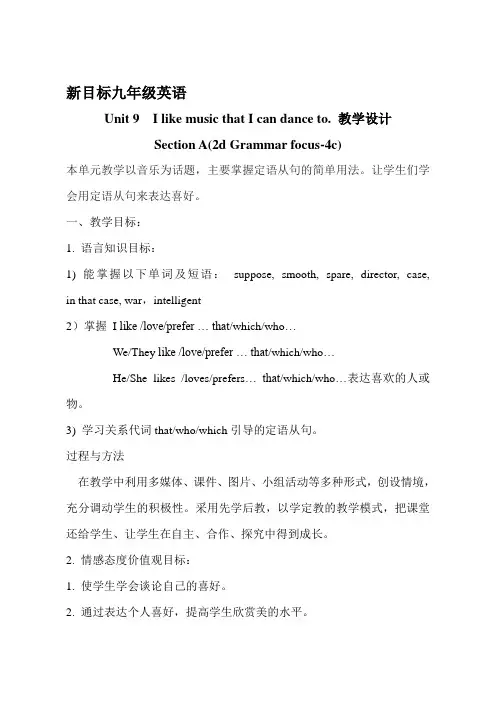
新目标九年级英语Unit 9 I like music that I can dance to. 教学设计Section A(2d Grammar focus-4c)本单元教学以音乐为话题,主要掌握定语从句的简单用法。
让学生们学会用定语从句来表达喜好。
一、教学目标:1. 语言知识目标:1) 能掌握以下单词及短语:suppose, smooth, spare, director, case, in that case, war,intelligent2)掌握I like /love/prefer … that/which/who…We/They like /love/prefer … that/which/who…He/She likes /loves/prefers… that/which/who…表达喜欢的人或物。
3) 学习关系代词that/who/which引导的定语从句。
过程与方法在教学中利用多媒体、课件、图片、小组活动等多种形式,创设情境,充分调动学生的积极性。
采用先学后教,以学定教的教学模式,把课堂还给学生、让学生在自主、合作、探究中得到成长。
2. 情感态度价值观目标:1. 使学生学会谈论自己的喜好。
2. 通过表达个人喜好,提高学生欣赏美的水平。
3. 激发学生的学习兴趣和学习热情。
二、教学重难点1. 教学重点:1)suppose, smooth,spare,director,case,in the case,war的用法。
2)句型:I like music that/which I can sing along with.She likes musicians who play different kinds of music.2. 教学难点:学习关系代词that/who/which引导的定语从句。
教学过程Step 1 Warming up1.Free talk. Ask “What kind of music/movies do you like?”I like musicthat/which/who …2.Have students report their answers to the whole class.【设计意图】课前热身,通过小对话交流简单了解个人喜好,再用知识扩充的形式去帮助学生认识和了解各种音乐类型的表达方式,很好地为接下来的个人喜好交流奠定基础。
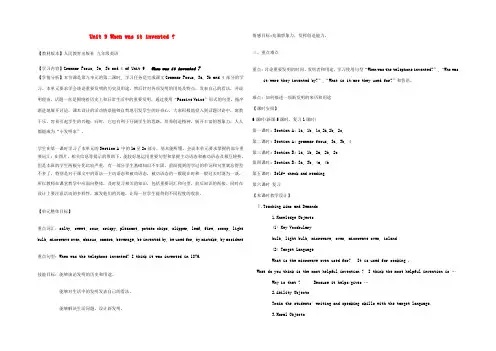
Unit 9 When was it invented ?【教材版本】人民教育出版社九年级英语【学习内容】Grammar Focus, 3a, 3b and 4 of Unit 9 When was it invented ?【学情分析】本节课是第九单元的第二课时, 学习任务是完成课文Grammar Focus, 3a, 3b and 4 部分的学习。
本单元要求学会谈论重要发明的历史及用途,然后针对各项发明的用处及特点,发表自己的看法,并说明理由。
话题一直是围绕着历史上和日常生活中的重要发明,通过使用“Passive Voice”形式的句型,循序渐进地展开讨论。
课本设计的活动情景能够自然地引发学生的好奇心,大家积极地投入到话题讨论中,寓教于乐,容易引起学生的兴趣;同时,它也有利于开阔学生的思路,培养创造精神,展开丰富的想象力,人人都能成为“小发明家”。
学生在第一课时学习了本单元的Section A 中的1a至2c部分,基本能听懂、会说本单元要求掌握的部分重要词汇;在图片,相关信息等提示的帮助下,能较好地运用重要句型和掌握主动语态和被动语态及相互转换。
但是本班的学生两极分化比较严重,有一部分学生基础知识不牢固,前面提到的学过的单词和句型就忘得差不多了,特别是对于课文中的语法—主动语态和被动语态,被动语态的一般现在时和一般过去时混为一谈。
所以教师在课堂教学中应面向整体,及时复习相关的知识,包括重要词汇和句型,前后知识的衔接。
同时在设计上要注意活动的多样性,激发他们的兴趣,让每一位学生能得到不同程度的收获。
【单元整体目标】重点词汇:salty, sweet, sour, crispy, pleasant, potato chips, slipper, leaf, fire, scoop, light bulb, microwave oven, abacus, camera, beverage, be invented by, be used for, by mistake, by accident重点句型:When was the telephone invented? I think it was invented in 1876.技能目标:能够谈论发明的历史和用途。
Unit 9 When was it invented?Language goals:In this unit students learn to talk about the history of inventions.New languages:When was the car invented?It was invented in 1885.What are they used for?They are used for seeing in the darks.Who were they invented by?It was invented by Julie Thompson.Difficult points:1. In this unit, the structure: Passive voice (questions and statements)2. How to improve the students’ listening, reading and writing ability. Teaching aids:puter, video, recorderTeaching periods:Period 1: Section A 1a / 1b / 1c / 2a / 2b / 2cPeriod 2: Grammar focus / Section A 3a / 3b / 4Period 3: Section B 1a / 1b / 2a / 2b / 2c / Self check 1Period 4: Section B 3a / 3b / 3c / 4 / Self check 2Period 1Teaching aims:1. Teach vocabulary words.2. Target languages:When was the car invented?It was invented in 1885.What are they used for?They are used for seeing in the darks.Who were they invented by?It was invented by Julie Thompson.3. Listen, talk and read about the inventions.4. Train the speaking and listening abilities.Teaching procedures:Step 1. Lead-inAsk students “Who has a mobile phone / bike? Does your family has a car / TV / puter…?” Watch the video and tell students these things were called inventions when they were first made. They are very useful inventions. They can make our life easier. Do you know any other inventions? List them on the paper.Step 2. PresentationAsk “When was the telephone invented?”“The telephone was invented in1876.”Get the students repeat the sentences several times. While students are repeating the sentences, the teacher writes down “When was / were …invented? It / They was / were invented in…”Watch the video. Look at some pictures and practice the similar dialogues.Explain “be +Past Participle” express Passive voice (Show a slide)e.g. English is spoken around the world.A bridge was built last year.Step 3. Section A 1a GroupworkShow a slide.1. Point to the pictures and ask students to say what they are—a puter, acar, a telephone, a TV and a calculator.2. Ask “Which one is the newest? Which one do you think is the oldest?”3. Discuss in groups and Number them 1-5.4. Check the answers.Step 4. Section A 1bThis activity gives students practice in understanding the target language in spoken conversation. Show a slide.1. Look at the pictures and the dates. You will hear a conversation betweena girl and a woman.2. Listen carefully and match the inventions and the dates.3. Listen again until students can catch it.4. Check the answers.Step 5. Section A 1c Pair workThis activity provides guided oral practice using the target language.1. Watch the video and call attention to the conversation. Ask two students to read it.2. Work in pairs. Look at 1b. Student A cover the dates. Student B, ask studentA when the things in the picture were invented. Then change roles andpractice again.3. Ask students to make similar dialogues using the things around them. Step 6. Section A 2a / 2b1. Show a slide with some inventions on it. Teach the vocabulary words. Readthem again and again and try to grasp them.2. Show another slide. Look at the picture. Here are the three inventions.You will hear a conversation between a girl and a boy. Listen and numberthe inventions in the order that you hear them.3. Listen carefully again and check up their answers.4. Ask a student say out his / her answer.5. The teacher shows the correct answers.6. Then show another slide. Look at the chart. It shows the people who inventedthese things and what they are used for. Listen to the recording again andmatch the items in column A, B and C.7. Play the tape many times until the students catch it. Then check the answers.8. Look at the tapescript and read the conversation aloud in pairs again and again.9. Explain the language points.e.g. Who was it invented?It was invented by…What is it used for?It is used for doing…Step 7. Section A 2c Pair workThis activity provides guided oral practice using the target language.1. Call attention to the sample conversation and ask two students to read it aloud.2. Role play the conversations using the information in the chart in 2b. Watchthe video and practice like this:What is it?It is a telephone.When was it invented?It was invented in 1876.Who was it invented by?It was invented by Alexander Bill.What is it used for?It is used for talking to people in other towns.Step 8. Conclusion1. Learn and master the vocabulary words.2. Master the target languages.When was the car invented?It was invented in 1885.What are they used for?They are used for seeing in the darks.Who were they invented by?It was invented by Julie Thompson.Homework:Find out an invention that you think is the most important. Write a short passage about it including the date, thepeople who invented it and what it is used for.Period 2Teaching aims:1. Learn to use Passive voice (questions and statements).2. Master some vocabulary words and target language.What do you think is the most helpful invention?I think the most helpful invention is the light bulb.I’d like to have a radio because I could listen to music all day.3. Train the speaking abilities by talking about more inventions.Teaching procedures:Step 1. Warming upWatch the video. Show some pictures about inventions such as puter, telephone, car, TV, calculator… Ask the students to practice speaking.A: When was…invented?B: It was invented in…A: Who was it invented by?B: It was invented by…A: What is used for?B: It is used for…Step 2. Lead-inWe have known some important inventions. Do you know any other helpful inventions or annoying ones? For example: A vacuum cleaner is helpful. A very loud truck is annoying. Show a slide to explain the language points. Step 3. Section A3a Pairwork1. Watch the video. Look at the pictures. There are some inventions (alarmclock, light club, microwave oven, tea, etc) . Ask students read themloudly.2. Ask students the following questions.T: Is the light club useful or annoying?S: I think it’s useful.T: Why is it?S: Well, it gives people more time to work and play every day.3. Ask the students to make a list of five helpful inventions and five annoyinginventions on their own, move around the room to offer help as needed.4. Let the students who would like to share their answers to read to the classand tell the reason.e.g. The alarm clock is an useful invention, I think. Because it alwayswake me up on time.Step4. Pairwork Section A3b1. Watch the video. Call attention to the conversation. Ask two students toread the conversation.2. Ask the students to work in pairs the following talk using the target language.Step5.GroupworkWatch the video. There is a picture. Imagine that you are alone on a tiny island. Chose five inventions you would like to have on the island with you.Tell the group what you chose and why. Then you can write it down using the following on the slide:I think the most helpful invention is…I’d like to have a… because I could…It’s used for…I also want a… because it…Step 6. PracticeDeal with some exercises about the grammar on the video.Step 7. Conclusion1. Master the target languages:What do you think is the most helpful invention?I’d like to have a radio because I could listen to music.2. Talk about helpful or annoying inventions.Homework:Continue finding out some useful and annoying inventions.Preview Section B 1a / 1b.Period 3Teaching aims:1. Strengthen the target language and practice more.2. Train the speaking and listening abilities.3. Describe some inventions.Teaching procedures:Step 1. Warming upHave a free talk. Ask the students to practice talking to each other.A: What do you think is the most helpful invention?B: I think the most helpful invention is…A: Why do you think so?B: Well, it gives me…Step 2. SectionB1a / 1bThis activity introduces new vocabulary.1. Read the four words and ask students to repeat them. Give them a minuteto read and write the words. Then tell the students they are adjectivesand they are used for describing things. For example: The apple is sweetand sour. Ask students to give some examples with the other words.2. Watch the video and tell what they are. (potato chips, lemon, ice cream, tea)3. Get the students to describe the things with the given adjectives. Somefood have more than one word.4. Check the answers.Say “What kind of food and drink do you like best?”Ask several studentsto write down on the blackboard.5. Such as: chocolate, oranges, banana, apple, salad, popcorn, orange juice and so on.6. Then ask the students to describe how food taste and finish 1b.Step 3. Section B 2a / 2bBrainstorm before listening. First, let students describe how potato chips taste and describe how helpful the potato to chips. Then ask: When and where were potato chips invented? Who were potato chips invented by? How were potato chips invented? Do you want to know?1. Say: You will hear a story about the invention of the potato chips.2. Watch the video. Ask the students to read the sentences and tell the classChinese meanings.3. Play the recording for the first time. Students only listen.4. Play the recording for a second time. Students circle T or F.5. If students can’t catch it, the teacher should play the tape some moretimes until thestudents finish the task.6. Check the answers.7. Watch the video. It shows the history of chips. Listen to the recordingagain and plete the sentences.8. Check the answers.9. Look at the tapescript and read it again and again.10. Watch the video and explain some language points.Step 4. 2c PairworkThis activity provides guided oral practice using the target language.Ask the students work in pairs. Role play the conversation about the invention of the potato chip. Use the information in 2b.e.g. A: Did you know potato chips were invented by mistake?B: Wow, I didn’t know that. Who invented them?A: They were invented by…B: When were they invented?A: They were invented in…B: How were they invented…C: …Step 5. PracticeFinish the exercises on the video in class. (workbook p85 3)Step 6. ConclusionLearn to describe how food taste.Learn some new vocabulary words.Improve speaking and listening abilities.Homework:Write a short passage about the history of an invention you think the most helpful. Preview Section B 3a / 3b / 3c / Self check.Period 4Teaching aims:1. Learn some new vocabulary words.2. Read about tea and know something about it.3. Train the reading and writing abilities.Teaching procedures:Step 1. Warming-upHave a free talk about some inventions.What do you think is the most helpful invention?When was it invented?Who was it invented by?What is it used for?How was it invented?Step2.Lead-inSay: Do you like drinking tea? Tea is a very healthy drink. Watch the video.There are different kinds of tea. Do you know who invented tea? When wastea invented? And how was tea invented?Step3.Reading Section 3a1. Show a picture. Look at the picture. Say: Who was the man? What was hedoing? What happened while he was doing this. Read the article byyourselves and answer the questions on the video. They can discuss ingroups.2. Ask several students to read their answers.3. Check the answers.4. Read the article again and discuss the difficulties in groups.5. Watch the video and explain some language points.6. Read the article again and again and try to retell it.Step5.Task 1 4a1. Say: We all have things that we don’t liking doing. Why not think ofan invention that could help you?2. Watch the video. For example, many students don’t like writing tests.You can invent a pen that listens and writes. It can be used for listeningand writing instead of you. The price should not be too high. It can be100 yuan each.3. Discuss in groups what they don’t like doing. Then think of an inventionthat could help them.4. After five minutes, ask several groups to tell the class their inventions. Step 6. Task 2 4bSay: Imagine you are a businessman. Work in pairs to ask your partner questions about his / her invention. Then try to sell your partner’sinvention to the class.e.g. This special pen was invented by…It has three colors and it is usedfor listening and writing English tests instead of you. And it is quitecheap—100 yuan each. Who wants to buy one?Step9.PracticeDeal with some exercises to consolidate the knowledge learned in this unit on the video in class.Homework:Review the whole unit and preview the reading.Period 5Teaching aims:Learn some new vocabulary words.Know about the history of basketball.Learn how to improve reading ability.Teaching procedures:Step 1. Before you readSay: Do you like doing sports? How many kinds of sports do you know?1. Watch the video. Look at some pictures. There are so many kinds of sports.People like sports because it can keep them fit and make them relaxing.Discuss in pairs. List eight sports played in China. And fill in the chart.2. After a while, ask students to read their answers.Such as: table tennis, tennis, basketball, football, volleyball, running,jumping, swimming, etc.3. Say: Do you think which sport is the most popular? And which one do youthink is less popular? Ask students to rank the sports they listed on orderof popularity. Students should be allowed to differ in opinion, based ontheir own knowledge. When finished, the different results should be shared,to find out which sports are considered the three most popular.Step 2. While you readSay: I think basketball is one of the most popular sports in China. I believe most students like playing basketball, too. Show a picture of Yao Ming. Ask: Do you know him? He is Yao Ming. And Yao Ming is known as a national hero by all the Chinese people. He is the pride of China. I think more and more people like playing basketball because of Yao Ming. But do you know who invented basketball? When was it invented? And how was it invented? Read the article alone, move around the room offering some help about pronunciation and grammar as needed. Find out the phrases. (Show a slide) Then learn them by heart.Step 3. After you read1. Watch the video. plete the mind-map with information from the reading.They can discuss in groups. Then check the answers.2. Without reading the article again, use what you remember from the mind-mapto answer the following questions. (Show a slide)(1) Who invented basketball?(2) Why were the Berlin Olympics important for basketball?(3) What is the aim of basketball?(4) Name a professional basketball organization in America.Step 4. Go For It!Say: Do you like playing basketball? Do you want to be a professional basketball player like Yao Ming? And would you like to play on China’s national basketball team one day? Is it good to be a basketball player? And there must be some difficult things. Discuss in groups to make a list of goodthings and difficult things about being a basketball players. Fill in the chart.(Show a slide)Step 5. ConclusionLearn some vocabulary words and some useful expressions.Improve the reading ability.Know something about basketball.Homework:In pairs, choose an invention and do research on it. Make a mind-map of the information you find. Then write a short passage about it.。
Unit 9 I like music that I can dance to教学目标:能够听懂并口头表达关于音乐类型的信息。
能够用英语描述音乐、乐器、音乐家等。
能够通过听、说、读、写的综合训练提高英语综合运用能力。
教学重点:了解不同音乐类型的特点。
能够用英语描述音乐类型。
学会用定语从句描述自己喜欢的音乐。
教学难点:运用定语从句描述自己喜欢的音乐。
听力训练的提高。
教学准备:多媒体课件。
Unit 9的教材及练习题。
Step 1: Warm-upThe teacher plays a piece of music and encourages students to guess the genre of the music based on the melody and lyrics.The teacher randomly asks students about their knowledge of music.Step 2: PresentationThe teacher introduces different genres of music and plays music of different genres to help students understand the characteristics of each genre.The teacher guides students to discuss the differences between different types of music and to describe the characteristics of different genres of music in English.Step 3: PracticeThe teacher designs a listening exercise where a piece of music is played and students choose suitable adjectives to describe the song.The teacher designs an exercise where students describe their favorite type of music and use relative clauses to describe the genre of music they like.Students work in pairs to discuss their favorite music and share their descriptions using relative clauses.Step 4: Productionteacher asks students to work in small groups and create a playlist of songs for a specific event or occasion, such as a party, a wedding, or a workout session. Each group presents their playlist and explains the reason for choosing the songs.The teacher encourages students to share their opinions about different types of music and engage in a class discussion about the role of music in people's lives.Step 5: Review and AssessmentThe teacher reviews the vocabulary and grammar structures covered in the lesson and provides additional practice exercises to reinforce the learning.The teacher assesses students' understanding of the lesson through a quiz, a writing assignment, or a role-playing activity.The teacher provides feedback and guidance to help students improve their language skills and achieve their learning goals.For homework, students can:Write a paragraph about their favorite type of music and use relative clauses to describe the genre of music they like.Create a playlist of songs for a specific event or occasion and write a short explanation for why each song was chosen.Research a famous musician or band and write a short biography about them, including information about their music and achievements.Listen to a song in a foreign language and write a brief summary of the lyrics, including any new vocabulary or expressions they learned.Watch a movie or TV show that features music as a major theme or plot element, and write a review of the film, focusing on how the music enhances the story or characters.。
盆尧一中师生共用教学案学科:英语年级:九课题:unit9 When was it invented? 第一课时P68主备人:沈静复备人:九年级英语组上课时间: 09/11/18 审核人:学习目标:被动语态重难点:主动语态和被动语态的差异。
预习题:英汉互译。
1.modern inventions2.couldn’t afford3.in those days4.我的一些朋友5.私人电脑 6.上历史课二、单项填空。
( )1.Can you tell me what _____?A . it calls B. does it call C. is it called D. it is called( )2.which one was _____ ,the computer or the TV?A .early B. earliest C. earlier D. the earliest( )3.In old days, people didn’t have many modern _______ ,like computer.A. inventingB. inventsC. inventionsD. inventors( )4.I didn’t have so much money when I was young, but I_____ now.A. doingB. amC. doesD. do( )5.The telephone was invented _____ 1876.A . in B. on C. at D. of三、知识点汇总。
1.被动语态(1)语态是动词的一中形式,表示句子中主语和谓语的关系,语态共有两种:主动语态和被动语态。
(2)两中语态结构对比:主动语态:主语 + 谓语 + 宾语(动作发出者)(及物动词)(动作承受者)被动语态:主语 + 谓语 + (by+)宾语(动作承受者) (be+v过去分词) (动作发出者)Eg. People speak English .English is spoken by people .(3)几种常用时态的被动语态:a.一般现在时的被动语态构成:主语+ am/is /are +v.的过去分词.Eg. This kind of car is made in China.Is this book written in English.b. 一般过去时的被动语态构成:主语+ was/ were +v.的过去分词.Eg.The trees were planted last year.The treesc. 一般将来时的被动语态构成:主+will/ be going to +be +v.的过去分词eg. The child will be sent back to his parents next month.These letters are going to be posted tomorrow morning .d.现在完成时的被动语态构成:主+ have /has +been + v.的过去分词eg. Those apples have been eaten up .Has his work been finished?e.现在进行时的被动语态构成:主+ am/is /are +being + v.的过去分词eg. The classroom is being cleaned now.Tow big bridge are being built in my hometown.f. 含有情态动词的被动语态构成:主+情态动词+be +v.的过去分词eg. Trees can be planted on the hill.Must the work be done before Friday?2.cover the dates. 学生A遮/盖住日期。
Cover v. 用东西盖住,遮住。
cover---with--- 用----盖住3. invent“发明,创造”,所发明的东西是原来不存在的;discover“发现”,指发现原来就存在的东西。
Eg. They discovered a new island. The scientist has invented lots or things.四、反馈测试题:I、选择题:( )1.The flowers _______ every day, or they’ll die.A must water B. can be watered C. should water D. must be watered( )2.Many of the stars _____ because they are far away from us.A . may not see B. cannot be seen C. mustn’t be seen D. needn’t see( )3.Today, the forests have almost gone. People must _____ down too many trees.A .stop to cut B.stop from cutting C.be stopped to cut D. be stopped from cutting ( )4.English _____ in Canada ,Australia and New Zealand as well as America and Britain. A. speaks B. is speaking C. is spoken D. spoke( )5.---Did you go to Jim’s birthday party?---No, I _____ .A . am not invited B. wasn’t invited C. haven’t invited D. didn’t inviteII、用所给的适当形式填空。
1.The basket is____ (fill) with fresh oranges.2.History is_____(make) by people.3.Sixteen-year-olds should not_____ ______(allow) to drive.4.Tomas Edision was a great ______(invent), he had more than 1,000 _____(invent) in his life.5.--when _____this kind of computers _______(invent)?--Two years ago.III.将下列句子变成被动语态。
1.Some of the students spend too much time playing computer games.Too much time _____ _______ playing computer games by some of the students. 2.Many people visited our school last week._____ _____ ____ _____ by many people last week.3.Teachers allow students to put up hands in class.Students ____ _____to put up hands ___ ___in class.4.We use knife for cutting things.A knife ____ _____ _____ ______things.小结反思盆尧一中师生共用教学案学科:English 年级:九课题:Unit9 when was it invented?第二课时P69-70主备人:沈静复备人:英语组上课时间:09/11 /19 审批人:学习目标:以各种发明为中心,练习被动语态的用法。
重难点:more,help+ful—helpful的用法一:预习作业 I、写出下列单词的过去式,过去分词。
1. go _____ ______2.do_____ ______3.have/has ______ ______4.eat _____ ______5.speak ______ ______6.take _______ _______7.see ______ ______ 8.invent ________ _______II. 用所给才词的适当形式填空.1.Edison was a great ______ .He had more than a thousand _______ .(invent)2.The water in the kettle is _______(heat) slowly.3.The plane ______ (use) for traveling.4.Rome______ (not build) in a day.5.Who ______ (invent) the light bulb?6.I think the ______ (help) invention is the light bulb.7.This kind of machine is used for______ (cut)二:知识汇总1.be used for doing sth.=be used to do sth.“被用来做某事”拓展:be used as “被当作----使用”,be used by “被---使用”,be used to doing sth. “习惯于做----”, used to do sth.“过去常常做----”eg. Clothes are used for keeping warm. The stick is used as a ruler.English is used by travelers and business people all over the world.I’m used to living here.I used to live there, but now I live in this city.2.help+ful—helpful “有帮助的”;care—careful;wonder—wonderful ;像这些词叫派生词,变比较级或最高级时在它们前面加more/most 。
3.more “更多的”与表示数量的词连用时more要放在数词的后面。